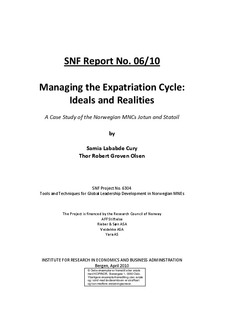| dc.contributor.author | Cury, Samia Lababde | |
| dc.contributor.author | Olsen, Thor Robert Groven | |
| dc.date.accessioned | 2010-10-06T08:28:24Z | |
| dc.date.available | 2010-10-06T08:28:24Z | |
| dc.date.issued | 2010-04 | |
| dc.identifier.isbn | 978-82-491-0702-5 (elektronisk versjon) | |
| dc.identifier.isbn | 978-82-491-0701-8 (trykt versjon) | |
| dc.identifier.issn | 0803-4036 | |
| dc.identifier.uri | http://hdl.handle.net/11250/165079 | |
| dc.description.abstract | Despite its cost, most MNCs depend extensively on expatriates in their internationalisation strategy. Not only do expatriates play an important role in providing the technical and managerial skills needed to set up and manage subsidiaries, but expatriation is often viewed as an important step in the process of developing global managers. Academics have suggested a number of techniques for maximizing these benefits. But do MNCs actually follow these recommendations? This thesis analyses “the realities” of the HRM practices in two Norwegian MNCs, Jotun and Statoil. The analysis is followed by a discussion about whether it matters if the observed reality deviates from the academic "ideals", and what MNCs can do to be closer aligned to academic best practice. | en |
| dc.language.iso | eng | en |
| dc.publisher | SNF | en |
| dc.relation.ispartofseries | Report | en |
| dc.relation.ispartofseries | 2010:6 | en |
| dc.title | Managing the expatriation cycle : ideals and realities : a case study of the Norwegian MNCs Jotun and Statoil | en |
| dc.type | Research report | en |
| dc.subject.nsi | VDP::Samfunnsvitenskap: 200::Økonomi: 210::Bedriftsøkonomi: 213 | en |
